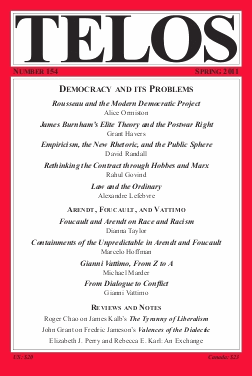Grant Havers’s “James Burnham’s Elite Theory and the Postwar American Right ” appears in Telos 154 (Spring 2011). Read the full version at TELOS Online website.
 This article discusses the reasons for the postwar American Right’s inattention to elite theory, or the study of the relation between elites and the masses. James Burnham, the most influential elite theorist of the postwar Right, has attracted the greatest interest in his work from the Left rather than the Right. His historicist appraisal of Machiavelli’s analysis of the elitist use of ethics failed to attract “value conservatives” on the Right who believed that the preservation of “timeless” values was unrelated to elite power. While his usage of Machiavelli’s realpolitik might have attracted populists on the Right who were suspicious of elites, Burnham rejected the populist belief in the people’s “virtue.” Yet Burnham’s theory of elite power deserves two cheers from conservatives for understanding both the historic relativity of values as well as the willingness of the masses to obey the elites. Burnham’s historicism and anti-populism might have saved conservatives from pinning their hopes in either the power of values or the people to effect change. Nevertheless, Burnham’s lack of interest in the power of mass religious belief compromises the value of his understanding of power, since, unlike Machiavelli, he underestimated the degree to which popular religion can threaten the power of elites.
This article discusses the reasons for the postwar American Right’s inattention to elite theory, or the study of the relation between elites and the masses. James Burnham, the most influential elite theorist of the postwar Right, has attracted the greatest interest in his work from the Left rather than the Right. His historicist appraisal of Machiavelli’s analysis of the elitist use of ethics failed to attract “value conservatives” on the Right who believed that the preservation of “timeless” values was unrelated to elite power. While his usage of Machiavelli’s realpolitik might have attracted populists on the Right who were suspicious of elites, Burnham rejected the populist belief in the people’s “virtue.” Yet Burnham’s theory of elite power deserves two cheers from conservatives for understanding both the historic relativity of values as well as the willingness of the masses to obey the elites. Burnham’s historicism and anti-populism might have saved conservatives from pinning their hopes in either the power of values or the people to effect change. Nevertheless, Burnham’s lack of interest in the power of mass religious belief compromises the value of his understanding of power, since, unlike Machiavelli, he underestimated the degree to which popular religion can threaten the power of elites.



